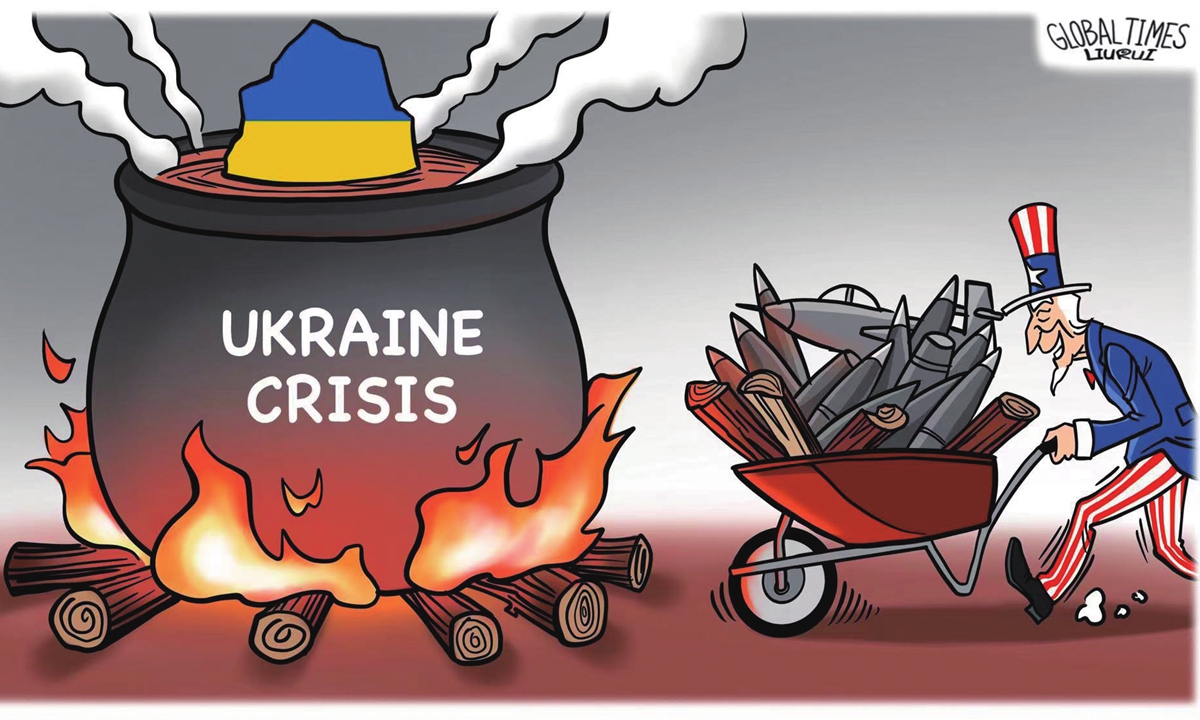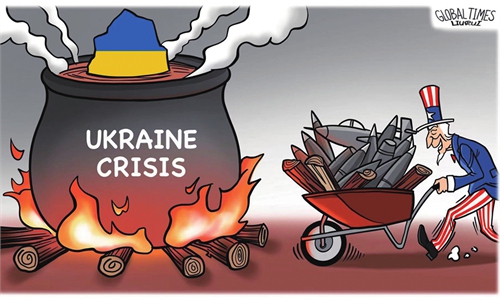
Illustration: Liu Rui/GT
Editor's Note:
The US and Ukraine have agreed to launch joint weapons production in a step that will enable Kiev to start producing air defense systems. However, the sluggish economic recovery in the US has only increased the sense of war fatigue across American society. As the Ukraine crisis drags on, the impending US elections are in the shadow. Meanwhile, the White House and some lawmakers are growing increasingly alarmed about the future of US military aid to Ukraine. How will the anti-war sentiment impact voting at the ballot box? How will the Russia-Ukraine conflict end? Global Times (GT) reporters Wang Wenwen and Yu Jincui interviewed three anti-war activists in the US – Sara Flounders (Flounders), a political writer and activist for 50 years in the US, Julie Tang (Tang), a retired judge from the San Francisco Superior Court and co-founder of Pivot to Peace, and Danny Haiphong (Haiphong), an independent journalist in the US and co-editor of Friends of Socialist China as well as a founding member of the No Cold War international campaign – to get their insights on how to address these issues.
GT: Is the anti-war sentiment in the US rising? Do the Republicans tend to attack the Biden administration by using this sentiment? What anti-war activities have been held recently?
Flounders: There are locally coordinated actions planned for the first week of October on US/NATO war in Ukraine. The goal is to organize actions in at least 50 US cities and to reach out to anti-war activists in other NATO countries. Many of the actions are still small or symbolic. But they will have the participation of community organizations, union activists and student groups. The biggest problem is that regardless of where they are held, they receive no media coverage.
Republicans now sound "anti-war" on Russia, because Biden, a Democrat, is in the White House, but in their messaging the Republicans are even more anti-China than the Democrats.
Both parties vote for endlessly expanding the military budget and for new rounds of sanctions. They bait each other on who can outdo the other in war threats and attacks. The messaging just depends on which of the two political parties is in the White House.
Tang: Americans are getting weary of the billions of dollars sent to Ukraine while the war has no end. They wanted politicians to turn their concerns toward domestic issues.
According to the recent labor market, 187,000 jobs have been added, but unemployment numbers have increased from 3.5 percent to 3.8 percent. This means there are still many more unemployed than there are jobs.
Inflation, the rising default rate in credit card debts, rising interest rates, national deficit at $32.8 trillion, and low personal savings are causing anxiety among American workers. They are much more concerned about their own livelihood and the failed US financial policies than supporting Ukraine or engaging in a war in the Taiwan Straits. As Americans turn more inward to worry about their own livelihood, pro-war fervor is waning.
It is interesting to see how the Republican presidential candidates are running on a platform of getting out of Ukraine. But some of their reasons are befuddling and do nothing to promote peace. They openly discussed shifting the focus from Russia to war with China. To me, it is not anti-war, but jumping from one war to another. There is no commitment to real peace. And the crack in this country on ending the war is more rhetorical to gain votes than to seek global peace.
Haiphong: War fatigue has been increasing since the US invasions of Iraq and Afghanistan, with bloated military budgets and economic instability causing domestic unease. However, rampant misinformation in US mainstream media means that it is difficult for people to coherently oppose war.
This means that partisanship indeed interferes on the issue of war fatigue. With each election cycle, one side of the two-party system accuses the other of being pro-war. The GOP under Trump's leadership has feigned anti-interventionism despite supporting increased military budgets, sanctions and other forms of aggression. The opposition is based on political opportunism, as the Democrats led by Obama derided "dumb wars" prior to coming into office only to expand the number of wars the US was engaged in from two to seven once in office.
GT: Compared today with more than a year ago when the Russia-Ukraine conflict just started, has there been any change in anti-war sentiment across the US public?
Flounders: Support is sinking dramatically from one year ago. Support for the war will continue to erode. While it is not yet reflected in open opposition in the streets, it will be. There is no money for any of the promised social programs or infrastructure needs. War and militarism are guaranteed profits.
Tang: Definitely. The anti-war sentiment is much strengthened as we see Ukraine's military incompetence and the failure of US sanctions against Russia. Some American leaders refused to admit Ukraine is losing. The press tweaked the news in Ukraine's favor creating a false impression that Ukraine is doing better than it actually is. That is why the majority of Americans polled believe that currently no one is winning the war. But the truth is Ukraine has been decimated, destroyed and will never be the same again.
GT: Will the protracted Ukraine crisis and the intensified anti-war sentiment caused by the US government's long-term involvement in Ukraine intensify the domestic confrontation in the US, and what impact will this have on next year's US elections?
Flounders: The impact on the US elections is not yet known. The problem in US electoral politics is that both major political parties in the US receive many millions of dollars in donations from the major military corporations and defense contractors. This ensures that regardless of who is in the White House and who is elected to the US Congress there is still firm support for US wars.
Tang: I think the Russia-Ukraine war can potentially exacerbate the domestic strife in the US. The rhetoric used by Republican candidates is clearly to attack the war as it is Biden's war. They waste no time pointing out Biden is wrong to take the war as far as it has gone. Therefore, to peace activists, it is in itself a good thing. And if the Ukraine war becomes an issue in contention in the presidential race, it could be the decisive factor for who wins the US presidency, because the anti-war movement is a solid bloc of votes and that could steer the campaign in the direction of the anti-war candidate.
Haiphong: At the moment, anti-war forces are not strong enough to have a major impact on establishment politics. However, the Ukraine crisis is causing economic and political instability which could very well influence politics in the US as more and more become unhappy with endless expenditures worth tens of billions going to Ukraine while standard of living declines.
How this will alter the course of politics in the US remains to be seen. Trump, if allowed to run, may be able to take advantage of Biden's self-inflicted quagmire in Ukraine and promote an isolationist position on economic grounds that may find more support than in 2020 when Trump reigned over a contracting US economy. A lot can change in a short period of time, but the fact is the Ukraine crisis is not going in the US' favor and Biden now has a track record of failure on this as well as many other issues that could make it difficult for him to win in 2024.
GT: How to you view China's efforts in promoting peace talks and resolve the Ukraine crisis?
Flounders: China's 12-point plan to negotiate peace and for a ceasefire and have received no serious media coverage or discussion in the US corporate media. At this time China's proposals, in the major corporate media, have received only warning to not be "fooled" by the proposals and to "dismiss" them as not serious.
The major corporate media functions as the public relations arm of the military corporations. They work hand in hand. They are interlocked, even sharing board members. The media is used to promote militarism and war as the only option. This is a relentless message.
Tang: China's efforts to promote peace between Russia and Ukraine bring hope for peace. As a friend of both countries, China is uniquely positioned to help forge peace agreements for both countries. But the response from the current US administration was negative. It did not want China to score more points or wield more power on international issues.
China has also demonstrated its diplomatic prowess by bringing Iran and Saudi Arabia together. Except for a few skirmishes with Vietnam and India, China has managed to maintain peace with its neighbors for the last 50 years. China has entered into hundreds of diplomatic agreements with Vietnam, the Philippines and other neighboring islands in the South China Sea. China is uniquely situated to help create a peaceful and prosperous multilateral world.
Haiphong: China should be commended for its efforts given the unique position it currently holds in the growing multipolar world. China has a responsibility to uphold the UN Charter, but it also has the right to sovereign development and an independent position on world affairs. China has been clear that peaceful settlement is the only path forward and has maintained neutrality on the Ukraine conflict. However, it has pointed out NATO's role in instigating and prolonging the conflict and at the same time strengthened its ties to all sides. China has made real efforts to facilitate dialogue as well. China has demonstrated that sovereignty and independence does not need to be sacrificed in matters of global stability. In fact, they go hand in hand, and China is the only major power in the world in the position to set this example at this time. It is a big responsibility, but it's one that China has shown time and time again that it is prepared to undertake.
GT: How do you predict the Russia-Ukraine conflict will end?
Flounders: This war will end as every US war in three generations has ended - Korea, Vietnam, Iraq, Afghanistan, and etc. in a setback for the great plans and imperialist promises, in trillions spent, enormous super-profits for the military corporations, massive destruction, millions of deaths, then on to the next enemy, the next war. There is no accountability, no evaluation.
But this war has another ending. A growing number of countries have lost all confidence in the US and are now seeking a path of cooperation rather than confrontation. This is a new juncture.

